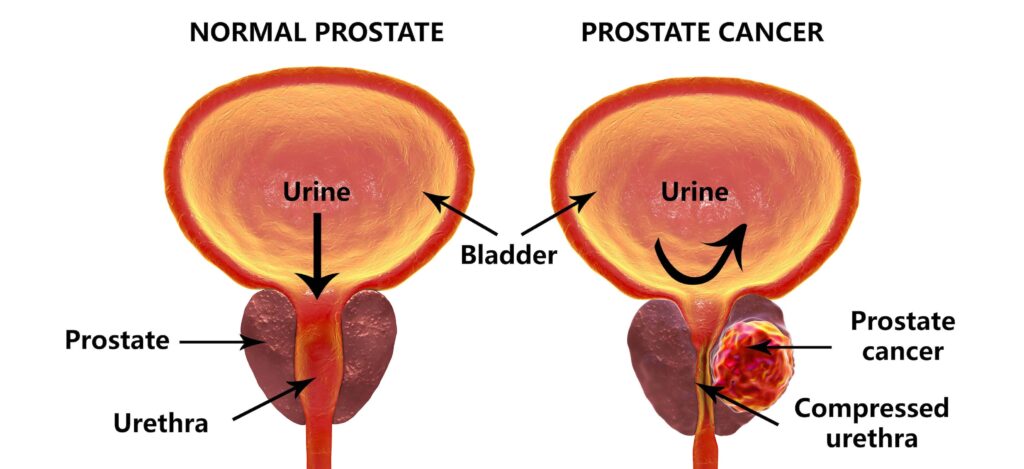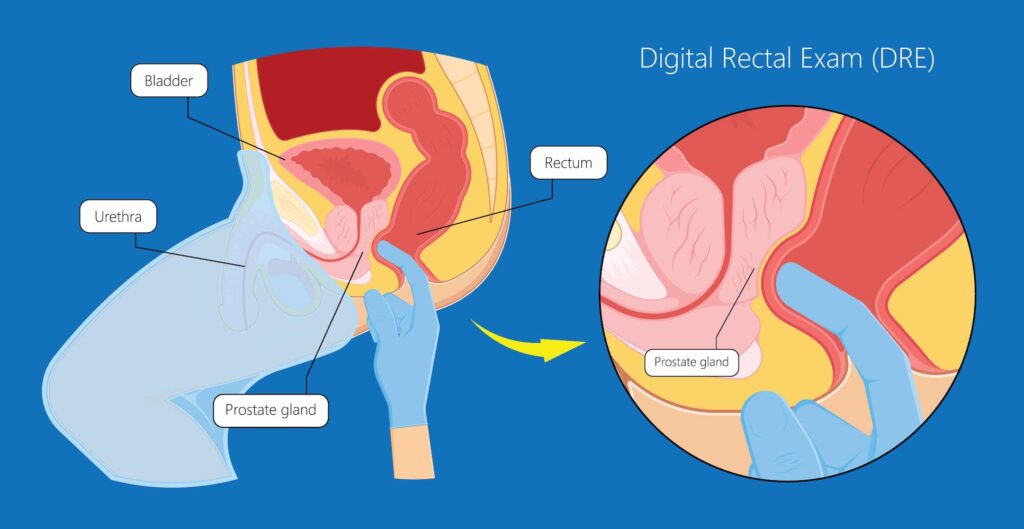Prostate cancer is the top most commonly diagnosed cancer for men in Singapore and the fifth leading cause of death worldwide. The risk of prostate cancer increases with age, especially among men in their 50s. Thankfully, prostate cancer is treatable, and with early detection, you can make a full recovery.
The prostate gland is a walnut-sized gland located below the urinary bladder and is responsible for the production of semen. Its development is controlled by the male hormone testosterone. Prostate cancer is the result of the uncontrolled proliferation of abnormal cells, resulting in a malignant tumour.

Prostate cancer does not cause any symptoms if it is in its early stages. At more advanced stages, some symptoms that you may experience include:
You should visit a prostate specialist in Singapore if you are experiencing any of the symptoms stated above. Additionally, men aged 50 years old and above or with a family history of prostate cancer may require a urological consultation to discuss prostate cancer screening.
Prostate cancer can be classified according to its risk of recurrence after treatment and is classified as low, intermediate, high or very high-risk prostate cancer. Risk classification is dependent on the following factors:
The table below summarises the different risk classifications of prostate cancer.
Low Risk
● PSA < 10 ng/ml And
● Gleason score of <7 And
● Non palpable tumour or a palpable nodule involving less than half of 1 lobe of the prostate
Intermediate Risk
● PSA 10-20 ng/ml Or
● Gleason score of 7 Or
● Palpable nodules involving only 1 lobe of prostate
High Risk
● PSA > 20 ng/ml Or
● Gleason score > 7 Or
● Palpable nodules involving both lobes of prostate
Very High Risk
● Tumour that extends beyond the prostate into surrounding structures Or
● The pelvic lymph nodes are involved
It is currently not known for certain what causes prostate cancer. However, there are certain conditions that can increase your risk of getting prostate cancer. Risk factors for prostate cancer are:
Contrary to popular belief, sexual activity is not a risk factor for prostate cancer.

Prostate cancer can be diagnosed by a series of tests, such as:
Yes, there is a blood test to help doctors determine the possibility of prostate cancer. The blood test analyses the levels of PSA (a protein produced by the prostate) in your blood. Unusually high PSA levels in your blood may indicate prostate inflammation, infection, enlargement or cancer.
It is important to note that elevated PSA levels do not necessarily mean that you have prostate cancer. Your urologist may carry out further investigations or a biopsy to confirm the diagnosis.
No preparation is required. However, if you have any conditions such as haemorrhoids, anal fissures or anal tears, please let your prostate specialist in Singapore know, as these conditions may cause discomfort during the examination.
Treatment of prostate cancer differs depending on the risk classification and stage of the cancer.
Active surveillance involves closely monitoring the progress of the cancer. This helps avoid unnecessary treatment, which, in turn, avoids possible complications associated with more aggressive forms of prostate cancer treatment, such as erectile dysfunction and urinary incontinence. For low-risk, localised prostate cancer, active surveillance may be recommended. Active surveillance involves regular blood tests, rectal exams and prostate biopsies to monitor the progression of the cancer. Should there be a progression of cancer, treatment will be given promptly.
Localised prostate cancer refers to cancer that has not spread to other tissues or organs.
Metastatic prostate cancer refers to cancer that has spread to other tissues or organs. The metastatic prostate cancer treatment options include
Yes, prostate cancer is curable if detected and treated early. Early diagnosis translates to earlier prostate cancer treatment and better chances of making a full recovery. Studies have shown that there is a 95-99% 5-year survival rate in men who were diagnosed with low and intermediate prostate cancer while it is localised. This percentage drops to 31% when prostate cancer has spread to other parts of the body.
Contrary to popular belief, robotic surgery is not performed by a robot independently but is performed by an experienced surgeon who guides the robot for the entire procedure through a console. These technological advancements allow for better visualisation, manual dexterity and control than what is possible with conventional techniques — a combination of the surgeon’s skill and critical thinking with the precision of a machine.
Furthermore, robotic surgery allows access to hard-to-reach areas using small incisions. This leads to a lower risk of complications and shorter recovery times.
Prostate cancer is known to be one of the most common cancers in men. Although different individuals may experience different symptoms, most do not have any symptoms at all (especially in the early stages). But there can still be a number of warning signs that one must be aware of, such as:
In addition to these symptoms, some patients may also experience symptoms such as pain and numbness in their legs and other parts of the body, a new onset of erectile dysfunction, and blood in the semen. Therefore, if you experience any of these warning signs, it is important to consult an experienced prostate specialist in Singapore to assess you thoroughly so that treatment can be started right away.
Prostate cancer in Singapore is one of the most successfully treated cancers, especially in its early stages. If this cancer is diagnosed and managed early, the prognosis tends to be more favourable. Most prostate specialists in Singapore may use a series of investigations to help them confirm the diagnosis. These tests typically include the prostate-specific antigen blood test (PSA), digital rectal examination (DRE), ultrasound scans, and magnetic resonance imaging (MRI).
Active surveillance plays an integral role in prostate cancer treatment in Singapore (low-risk cancers). For more aggressive prostate cancers, the management plan will depend on the grade, stage, and risk classification of the cancer. Treatment usually involves surgery and radiation therapy, which is beneficial in treating localised cancers. The main treatment for prostate cancer is radical prostatectomy and it involves removing the entire prostate gland, including the seminal vesicles. If needed, the lymph nodes may also have to be removed.
This procedure may also be carried out laparoscopically or by robot-assisted surgery. However, it must be noted that not all surgeons can perform robotic surgery; only a Urologist who has been trained with the necessary skills can carry out this procedure.
Unfortunately, yes. If the cancer is detected late or left untreated, it has the potential to become life-threatening. However, this is not the case for most prostate cancers, as they usually grow slowly and stay confined to the prostate gland. These patients usually have a very good chance of survival if treatment is commenced promptly. However, those with more aggressive types of prostate cancer may find that the cancer spreads quickly, making management challenging especially in the advanced stages. These cancers will require prompt radical treatment in the form of surgery and/or radiotherapy for the optimal outcomes. Therefore, it is vital to consult a urologist with the experience of treating such advanced cancers.
Prostate cancer in Singapore is the second most commonly diagnosed cancer in males and is typically seen in those over the age of 50. It also has a significant mortality rate, especially for untreated cases in their advanced stages, emphasising the need for early detection and treatment. When it comes to the life expectancy of a person with prostate cancer, those with low Gleason grades are expected to have a 5-year survival rate of over 95%. Conversely, patients whose cancer has spread (metastasised) may have lower survival rates.
The Gleason score is a measure of how aggressive the cancer cells are, and they are graded on a scale of 1 to 5. However, each area of the prostate cancer assessment may have different scores, so the pathologist will examine the cancer cells to determine the most common grades and these will be added to achieve the final score. For instance, if an individual’s largest area with cancer is Grade 3 and another large area indicates Grade 4, the Gleason score for this sample would be 3+4=7. The higher the score, the more aggressive the cancer is. A score of 6 would denote a non-aggressive type of cancer, while a score of 8 and above will indicate that the person may have a highly aggressive form of prostate cancer.
As mentioned previously, the survival rates for localised prostate cancers in the early stages are considerably high. According to data obtained from the American Society of Clinical Oncology, the estimated survival rate for 10 to 15 years after treatment ranges between 95% to 98% (for localised cancers). Although the survival rates for those with distant metastasis (spread to other organs) aren’t usually favourable, aggressive treatment may help them survive their condition for more than five years.
Need more information? Reach out to our team at Assure Urology & Robotic Centre today and book an appointment with one of the finest and most reputed prostate specialists in Singapore.
Cancer is a frightening word for most, but with early detection and treatment, prostate cancer can be cured, and you will be able to live your life to the fullest. If you suspect that you may have prostate cancer or are at a higher risk of developing prostate cancer, schedule an appointment with a urology doctor in Singapore to undergo regular screenings and discuss your treatment options.

MBBS, MRCSed, MMED(Surgery)
Dr Terence Lim is a Senior Consultant Urologist with a subspecialty in Uro-Oncology. He is also the Medical Director at Assure Urology & Robotic Centre. His clinical interests include Uro-Oncology, Minimally-invasive Urological Surgery, Urinary Stone Disease, Endourology and Prostate Health.
Prior to his private practice, Dr Terence Lim spent almost two decades in public healthcare. He served as the Senior Consultant and Chief of the Department of Urology at Changi General Hospital (CGH). In addition, he is currently a Visiting Consultant at CGH. Dr Lim was also the director of CGH’s Advanced Surgical Centre, a committee dealing with complex surgeries, including robotic surgeries.
Your health is important to us and some conditions require immediate attention. For emergencies, please contact us at 9835 0668.

MBBS, MRCSed, MMED(Surgery)
Dr Terence Lim is a Senior Consultant Urologist with a subspecialty in Uro-Oncology. He is also the Medical Director at Assure Urology & Robotic Centre. His clinical interests include Uro-Oncology, Minimally-invasive Urological Surgery, Urinary Stone Disease, Endourology and Prostate Health.
Prior to his private practice, Dr Terence Lim spent almost two decades in public healthcare. He served as the Senior Consultant and Chief of the Department of Urology at Changi General Hospital (CGH). In addition, he is currently a Visiting Consultant at CGH. Dr Lim was also the director of CGH’s Advanced Surgical Centre, a committee dealing with complex surgeries, including robotic surgeries.
Your health is important to us and some conditions require immediate attention. For emergencies, please contact us at 9835 0668.
No issue is too small. Contact any of our friendly staff and we will get back to you as soon as possible.
Reach out to us for expert urological care.
For enquiries, leave a message and our friendly team will get in touch with you.
For urgent enquiries after office hours, call or WhatsApp us at (65) 9835 0668.
Monday – Friday: 9:00AM – 5:00PM
Saturday: 9:00AM – 12:30PM
Sunday & Public Holiday: CLOSED

© 2023 All Rights Reserved | Assure Urology & Robotic Centre | Terms & Conditions